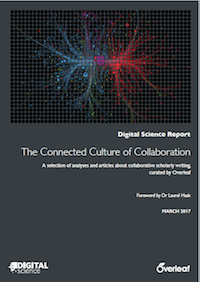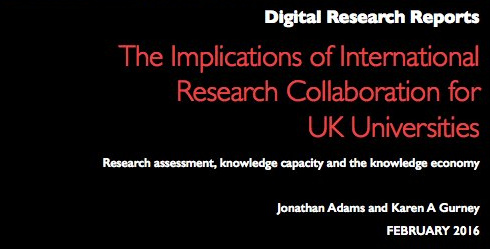A Story About Science Together
The unconference about tools and rules in collaborative research.
Send us a link
The unconference about tools and rules in collaborative research.
The growing need for collaboration among young scientists is more essential now than ever before, with careers in research becoming more uncertain and perilous.

Brain drain to Western nations has apparently left researchers in Eastern Europe with fewer foreign co-authors.

An analysis of more than 50 collaborations shows the secrets of success, write Joel Cutcher-Gershenfeld and colleagues from the Stakeholder Alignment Collaborative.

New report looks at real-time global research collaboration for the first time, uncovering a new picture of collaborative research.

Report highlighting the need for a reference database of research organisations.

Soft skills like teamwork and communication could boost undergraduates' career prospects.
Diverse approaches suit different goals.
How open licenses can simplify international research when multiple research projects are involved and when projects have ended.
In an era where research bureaucracy is the biggest burden bestowed upon scientists, some are seeking practical solutions.

A spirit of collective enterprise in scientific research is being replaced by a rush to assign precise credit for who did what.

Utilizing 250,000 papers from ArXiv.org we construct large coauthorship networks to investigate how individual network positions influence scientific success. Surprisingly, inter(sub)disciplinary collaborations decrease the probability of getting a paper published in specialized journals for almost all positions.
Think tanks are seen as independent, but their scholars often push donors’ agendas, amplifying a culture of corporate influence in Washington.

How is the rise in team science and the emergence of the research group as the fundamental unit of organization of science affecting scientists’ opportunities to collaborate?
A paper exploring the dynamics of interdisciplinary research in Italy over 10 years of scientific collaboration on research projects.

"Science is, indeed, a profoundly social activity": Jeremy Berg's first Science editorial
Explore the benefits of building bridges and pick up some tips about how to do it in this collection of articles from our archives.

We interviewed Mark Hahnel, founder of figshare to discuss Collections, a new, free resource developed by the figshare team, and how researchers can use this.
Not a scientist? As David Lang shows, you can still play a meaningful role in solving science’s hardest problems.

When physicists and mathematicians venture into the social sciences, new discoveries await — but a lot of bickering and mistrust must be overcome first.

Where once scientists used to be solitary creatures, today science is a highly collaborative affair, and the latest research in ecology is no exception.
A report on international academic collaboration across the UK research base and on the implications of EU and global collaboration for universities, research assessment and the economy.

Universities need to expand international engagement to remain competitive, according to a report by Digital Science.
This study shows that the long-run patterns of international scientific collaboration are generating a convergence between applied and basic fields. This convergence of collaboration patterns across research fields might be one of contributing factors that supports the evolution of scientific disciplines.
Big US report documents increases in international collaboration and Chinese science output.

Too many senior scholars abuse their power when it comes to assigning credit.

Written agreements between parties in research collaborations are not a sign of a lack of faith.
An empirically-informed conceptual model to explain co-author crediting outcomes.
The small but focused snapshot of research afforded by the Nature Index helps fine-tune analysis of global scientific collaboration.
Understanding emerging areas of a multidisciplinary research field is crucial for researchers, policymakers and other stakeholders. For them a knowledge structure based on longitudinal bibliographic data can be an effective instrument.